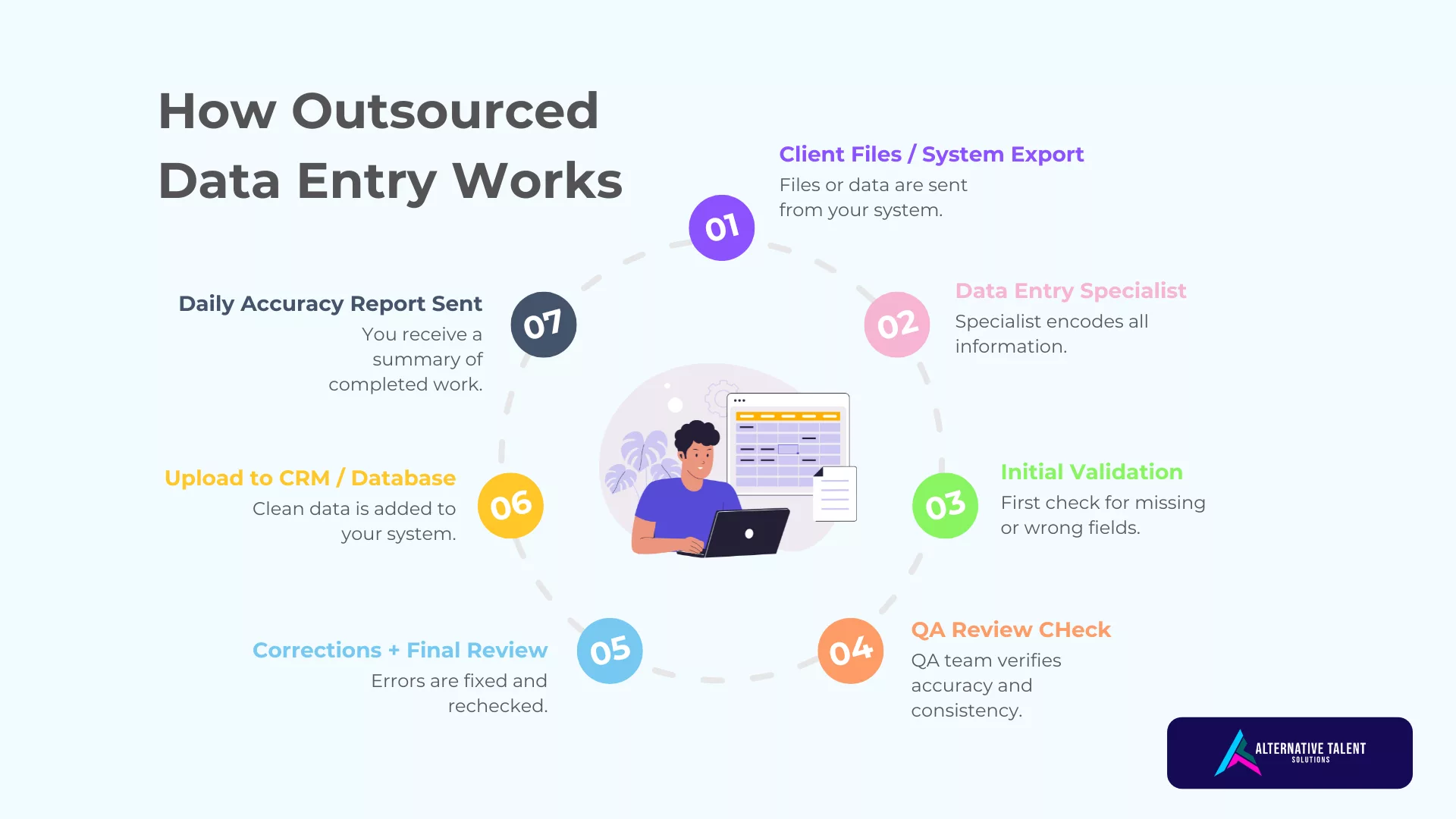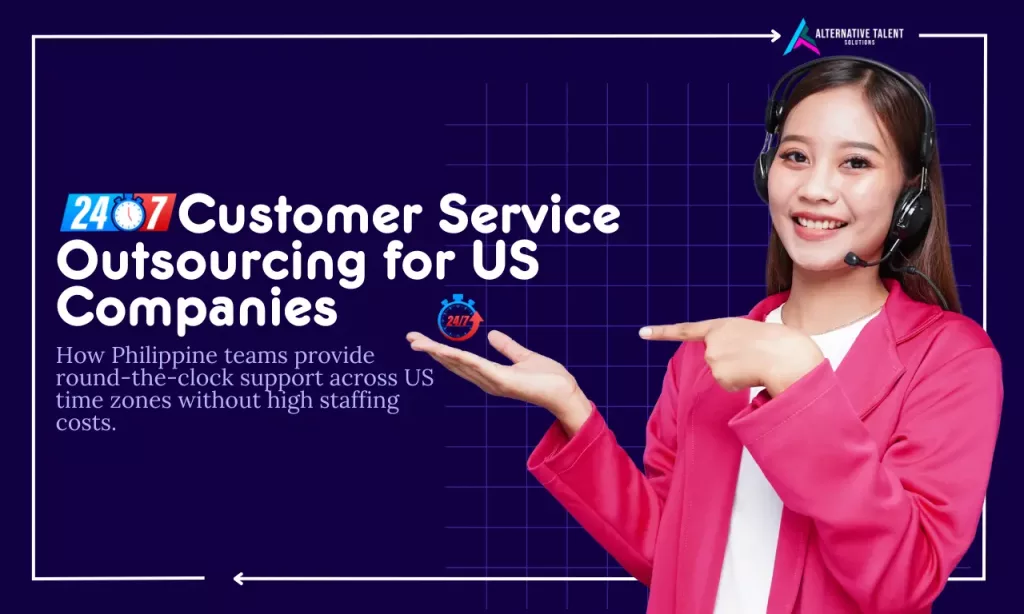Data entry shapes how your business makes decisions. When it’s done well, your reports are clean, your customers get accurate updates, and your processes run smoothly. When it’s done poorly, mistakes spread fast—wrong billing amounts, incorrect records, missing orders, and unreliable reports.
Outsourcing data entry gives you trained specialists who process large volumes of information with accuracy and consistency. This guide explores industry-specific use cases, common errors outsourcing prevents, quality steps to expect, and cost ranges for Philippine-based teams.
1. Why Businesses Outsource Data Entry
Data entry takes time, focus, and a steady routine. Many teams struggle with it because:
- Staff juggle multiple tasks
- Errors pile up during peak seasons
- Backlogs grow faster than they’re cleared
- Reports become unreliable
- Customer complaints increase
Outsourcing ensures your data is handled by specialists whose only job is to process, clean, and verify information—reducing mistakes and improving efficiency.
If data tasks are slowing your team down, you can read our complete guide to back-office outsourcing services to understand how businesses delegate repetitive work efficiently.
2. Industry Use Cases
Different industries rely on data accuracy in different ways. Here are the most common use cases.
Healthcare
Healthcare teams deal with protected health information (PHI), insurance details, and patient records.
Common outsourced tasks:
- Updating patient information
- Claims data entry
- Billing records
- Medical transcription
- Appointment logs
- Lab result encoding
Why accuracy matters:
A single mistake can delay claims, cause wrong billing, or affect patient care.
Healthcare teams handling PHI need strict processes, so it helps to review our HIPAA-compliant outsourcing guide to see how secure data-handling works in real workflows.
eCommerce
eCommerce businesses generate a continuous stream of data from multiple sales channels.
Common outsourced tasks:
- Order entry
- Product listings
- SKU updates
- Inventory records
- Price updates
- Customer information cleanup
Why accuracy matters:
Wrong stock levels lead to overselling, refunds, and negative reviews.
Finance
Financial teams depend on error-free documentation to stay compliant.
Common outsourced tasks:
- Invoice encoding
- Expense logs
- Bank reconciliation support
- Payroll data preparation
- Vendor records
- Accounts payable/receivable data
Why accuracy matters:
One wrong digit can affect tax reports, budgeting, or payment schedules.
Logistics
Logistics involves constant tracking and documentation.
Common outsourced tasks:
- Shipment updates
- Delivery status logs
- Driver reports
- Load sheets
- Warehouse inventory
Why accuracy matters:
Mistakes lead to delays, wrong deliveries, or operational confusion.
Real Estate
Real estate agencies handle large amounts of client and property data.
Common outsourced tasks:
- Listing details
- Document preparation
- CRM updates
- Lead logs
- Property information
Why accuracy matters:
Inaccurate property details lead to mistrust and missed leads.
3. Mistakes That Outsourcing Helps Prevent
A trained data entry team reduces the most common errors:
Duplicate Entries
Duplicate customer or product records create confusion across systems.
Wrong Spelling or Misplaced Values
Typos affect billing, shipping, and reporting accuracy.
Missing Fields
Blank sections delay approvals, claims, or submissions.
Inconsistent Formatting
Reports become harder to read and analyze.
Delayed Updates
Slow data updates lead to outdated information and operational mistakes.
Poor Version Control
Multiple versions of the same file create internal conflicts.
These problems cost time, money, and customer trust. Outsourcing minimizes them by using structured workflows and QA checks.
4. What Accuracy and QA Steps Look Like
A reliable data entry provider follows a clear accuracy process:
Standard Formatting Rules
Consistent naming, file formats, and structures.
Double-Entry Verification
Two specialists encode the same data and compare outputs.
Random Accuracy Audits
QA teams review a percentage of daily output.
Automated Error Flags
Tools highlight incomplete or mismatched fields.
Mandatory Checklists
Encoders follow steps to prevent missed data points.
Daily or Weekly Reporting
Accuracy rate, volume processed, and error logs are reviewed regularly.
A strong QA structure ensures clean, reliable, and usable data.
Philippine Data Entry Cost Range
Data entry outsourcing in the Philippines is cost-effective and scalable.
Typical Rates
- Part-time encoder: $350–$600/month
- Full-time encoder: $600–$900/month
- Senior/QA-supported roles: $900–$1,200/month
Cost varies depending on:
- Industry
- Complexity
- Tools required
- Shift coverage
- Volume of work
If you want to see how data entry fits into overall outsourcing budgets, our breakdown of outsourcing rates in the Philippines shows real numbers businesses use for planning.
6. Simple Workflow Diagram — How Outsourced Data Entry Works
A strong outsourcing workflow ensures your data is handled accurately and consistently. Below is a simple structure most teams use. It shows how information moves from your systems to the outsourced team and back into your database once verified.
Step-by-Step Workflow (Explained)
- Data Collection: You send files, spreadsheets, scanned documents, or system exports.
- Data Entry: Trained specialists encode all fields following your formatting rules.
- Initial Validation: Encoders review their own work before submitting it.
- QA Review: A separate QA specialist checks accuracy, completeness, and formatting.
- Corrections: Any mismatched or missing entries are fixed and revalidated.
- Final Output: Clean, verified data is prepared for upload.
- System Upload: Data is inserted back into your CRM, ERP, EMR, or database.
- Daily Reporting: You receive a summary of the volume completed and the accuracy rates.

This structure keeps data reliable and prevents issues like duplicates, wrong fields, or missing values.
7. How Outsourcing Improves Your Operations
Here’s what businesses typically notice within weeks:
- Faster processing times
- More accurate reports
- Clean customer records
- Lower operational stress
- Fewer repetitive tasks for internal teams
- Clearer decision-making
- Predictable, stable workflows
Data entry is foundational. When it’s clean, the rest of your business runs smoother.
What to Do Next
If your team is losing hours each week updating records, fixing errors, or clearing backlogs, outsourcing can help stabilize your workflow. Start simple:
Step 1 — List your daily data tasks
Identify repetitive tasks you want to offload.
Step 2 — Pick your coverage
Half-day, full-day, or 24/7 support.
Step 3 — Start with one trained encoder
You can scale as your needs grow.
ATS can provide trained data entry specialists who follow strict accuracy and QA standards so your operations stay clean, organized, and reliable.













